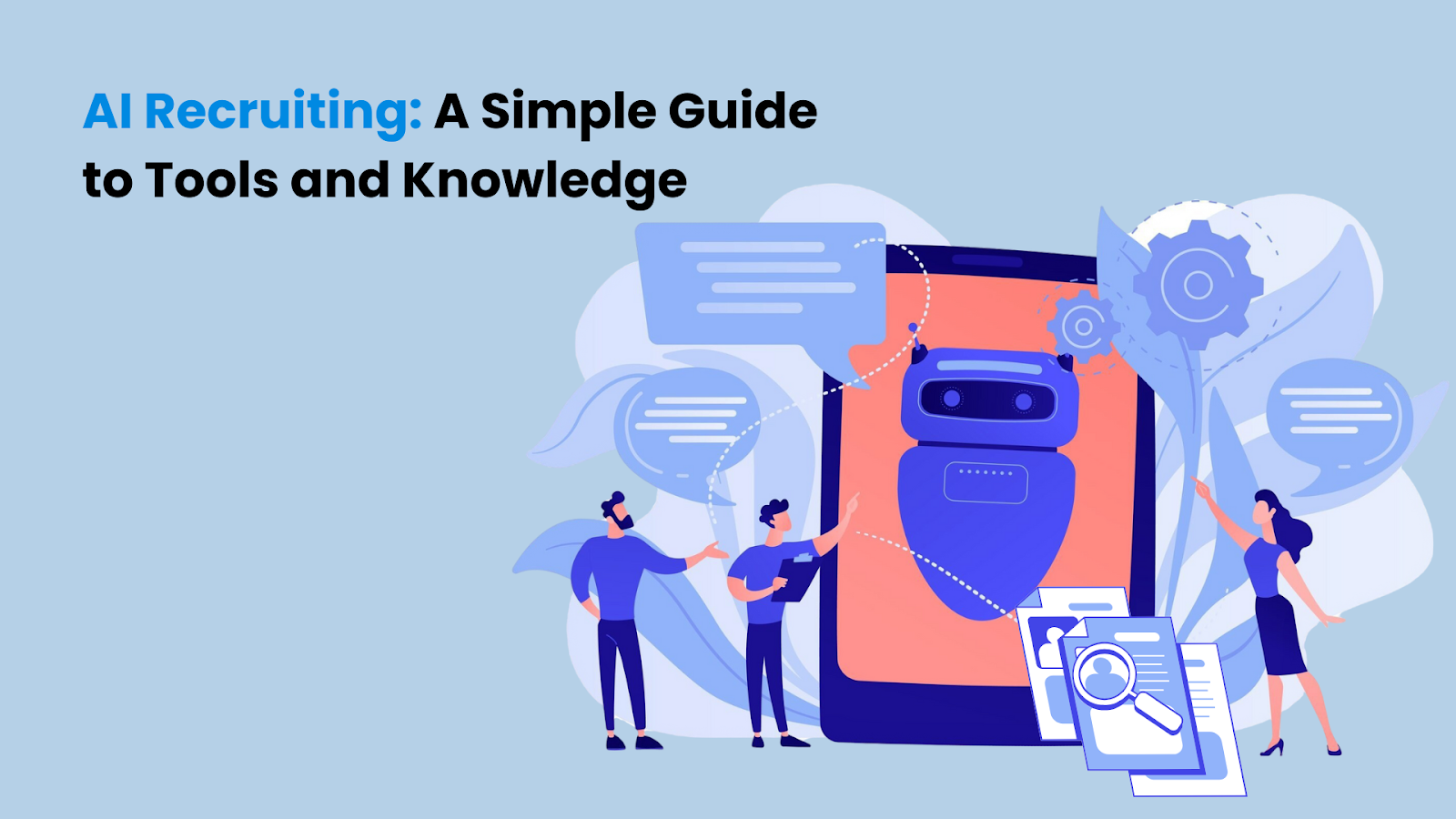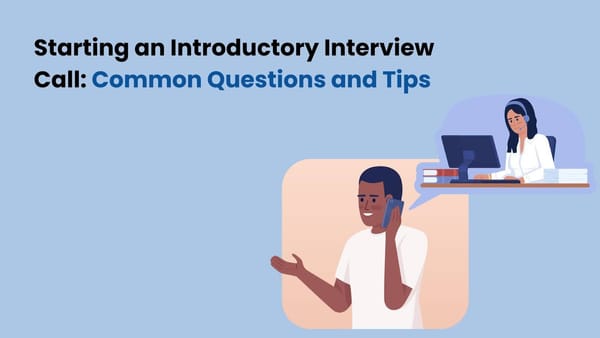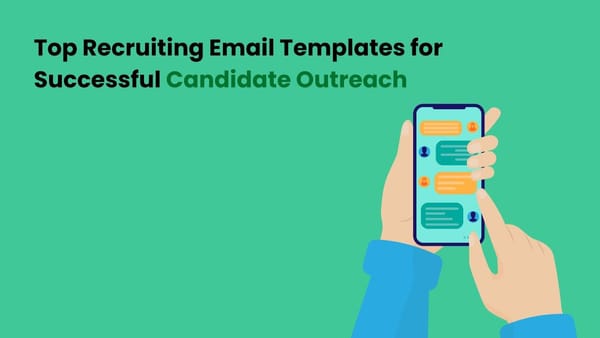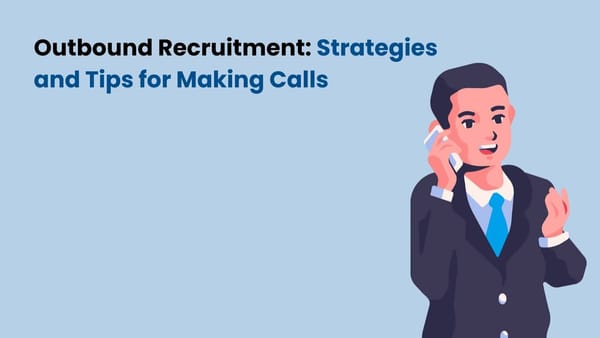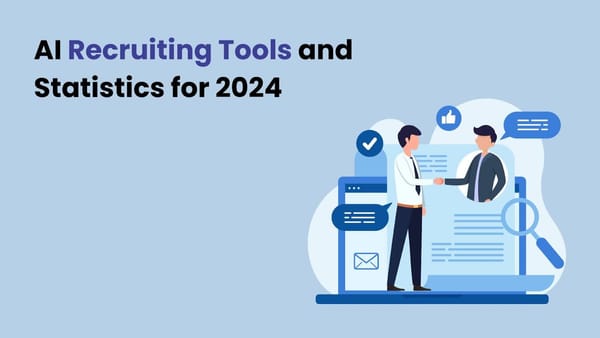Did you know the global AI recruitment market is set to hit $890.51 million by 2028, growing at a CAGR (Compound annual growth rate) of 6.5%? AI is reshaping how businesses find talent, from automating resume screening to improving candidate communication.
Artificial Intelligence is revolutionizing the hiring process, making it faster, smarter, and more efficient. Whether you're a small business owner or part of a large HR team, understanding how to use AI can give you a significant edge in attracting top candidates.
In this guide, we'll break down what AI in recruiting is, why it's becoming essential, highlight some of the top AI tools and platforms, and discuss how to choose the right AI recruiting tool. By the end, you'll have a clear idea of how to integrate AI into your recruitment process and the benefits it can bring to your organization.
What is AI in Recruiting?
AI in recruiting refers to using artificial intelligence technologies to enhance and automate various stages of the hiring process. This includes finding and attracting candidates to screening resumes, conducting interviews, and even predicting which candidates will thrive in your organization.
For example, AI-powered tools can automatically search through thousands of resumes to find the most qualified candidates, saving you hours of manual work. Chatbots can engage with candidates in real time, answering their questions and guiding them through the application process. Additionally, AI can analyze data from past hires to predict which candidates are likely to succeed in your organization.
By integrating AI into recruiting, businesses can reduce the time spent on manual tasks, minimize human error, and focus more on building relationships with candidates. This not only speeds up the hiring process but also improves the overall quality of hires by ensuring that the right people are selected for the right roles.
Now that we understand AI in recruiting, let's explore its various applications.
Applications of AI in Recruitment
AI has a wide range of applications in the recruitment process, each designed to make hiring more efficient and effective:
- Candidate Sourcing: AI tools can search multiple databases, social media platforms, and job boards to find potential candidates who meet specific criteria, expanding your talent pool. This automated sourcing ensures that no qualified candidate is overlooked.
- Resume Screening: AI-powered systems can automatically review and rank resumes based on predefined qualifications, significantly reducing the time spent on manual screening. These systems can identify key skills, experiences, and qualifications, prioritizing candidates who best match the job requirements.
- Chatbots and Virtual Assistants: These tools can interact with candidates 24/7, answering queries, scheduling interviews, and providing updates. This constant availability improves the candidate experience by ensuring timely and personalized communication.
- Interviewing: AI-driven video interview platforms can analyze candidates' responses, facial expressions, and tone of voice to assess their suitability for the role. These platforms can provide insights into a candidate's soft skills and cultural fit, complementing traditional interview methods.
- Predictive Analytics: By analyzing past hiring data, AI can forecast which candidates are likely to perform well and stay with the company long-term. This helps in making data-driven hiring decisions that align with organizational goals.
- Onboarding: AI tools can automate the onboarding process, ensuring new hires receive all necessary information and training materials promptly. Personalized onboarding experiences can help new employees integrate smoothly into the company.
- Employer Branding: AI can help create personalized content and targeted campaigns to attract top talent and strengthen your employer brand. By analyzing what candidates are looking for, AI can tailor your messaging to better resonate with your target audience.
- Talent Pipeline Management: AI can help manage and nurture talent pools, keeping potential candidates engaged over time. This proactive approach ensures that you have a ready supply of qualified candidates for future openings.
- Skill Assessments: AI-powered assessment tools can evaluate candidates' technical and soft skills through interactive tests and simulations, providing a more comprehensive understanding of their capabilities.
- Diversity and Inclusion: AI can help promote diversity by identifying and eliminating biased language in job descriptions, ensuring a wider and more diverse pool of candidates.
With these applications in mind, let's explore the benefits AI brings to the recruitment process.
Benefits of AI in Recruitment
Integrating AI into your recruitment strategy offers numerous advantages:
- Increased Efficiency: AI automates time-consuming tasks like resume screening and candidate sourcing, allowing your HR team to focus on more strategic activities. This leads to faster hiring cycles and reduces the administrative burden on your team.
- Enhanced Candidate Matching: AI tools analyze vast amounts of data to identify candidates who not only have the right skills but also fit your company culture. This ensures a higher quality of hires and better alignment with organizational values.
- Reduced Bias: AI can help minimize unconscious biases in the hiring process by focusing on objective data and predefined criteria. This promotes diversity and inclusion within your organization, creating a more dynamic and innovative workplace.
- Improved Candidate Experience: Automated communications and timely updates keep candidates engaged and informed, enhancing their overall experience. A positive candidate experience can improve your employer brand and increase the likelihood of offer acceptance.
- Cost Savings: By streamlining the recruitment process, AI can reduce hiring costs associated with lengthy hiring cycles and high turnover rates. Efficient hiring processes save both time and money, contributing to overall business profitability.
- Data-Driven Decisions: AI provides actionable insights and analytics, enabling you to make informed hiring decisions based on real-time data. This helps in refining recruitment strategies and improving overall hiring outcomes.
- Scalability: AI tools can easily scale with your organization's growth, handling high-volume recruitment campaigns without compromising on quality. This makes AI an ideal solution for businesses of all sizes.
- Continuous Improvement: AI systems learn and improve over time, becoming more accurate and efficient with each use. This ensures that your recruitment processes stay up-to-date with the latest trends and best practices.
To fully grasp these benefits, choosing the right AI recruiting platforms is essential. Let’s take a look at some of the top tools available.
Top AI Recruiting Platforms
Selecting the right AI recruiting tools can significantly impact your hiring success. Here are some of the top AI-powered platforms to consider:
1. TidyHire
TidyHire is a comprehensive AI-driven recruitment tool designed to streamline and enhance your hiring process:
- AI Recruiter (Ria): Tidyhire's Recruiting Intelligence Agent (Ria) automates tasks such as candidate sourcing, personalized outreach, and follow-ups, allowing recruiters to focus on strategic decision-making.
- Extensive Candidate Database: Access over 700 million professional profiles and 35 million companies, enabling recruiters to source verified candidates from diverse industries and locations.
- TidyHire Chrome Extension: Allows you to source candidates directly from networking sites, retrieving essential contact details like emails and phone numbers. This seamless integration boosts your productivity and ensures consistent communication.
- Multi-Channel Communication: Engage candidates through various platforms, including email, LinkedIn, SMS, and WhatsApp, ensuring effective and timely interactions.
- Automated Outreach Campaigns: Create and launch personalized recruitment campaigns with AI assistance, including automated follow-ups, to improve candidate engagement and response rates.
- Integration with Workflow Tools: Seamlessly integrates with platforms like Slack and Microsoft Teams, allowing recruiters to manage the hiring process within their existing workflows.
2. LinkedIn Recruiter
A widely-used tool that uses LinkedIn’s extensive network to help you find and connect with professionals across various industries. It offers advanced search filters, InMail messaging, and analytics to track your recruitment efforts effectively.
3. HireVue
An AI-driven video interviewing platform that automates scheduling, records interviews, and uses predictive analytics to assess candidate fit and potential success. HireVue helps streamline the interview process, making it easier to remotely evaluate candidates’ skills and cultural fit.
4. Pymetrics
Uses neuroscience-based assessments and AI to match candidates with roles that align with their cognitive and emotional strengths. Pymetrics promotes better job fit and improves employee retention by ensuring hires are well-suited.
5. Beamery
A recruitment marketing platform that uses AI to engage passive candidates, manage talent pools, and nurture relationships through personalized outreach. Beamery helps build a strong employer brand and keeps potential candidates interested in your company over time.
While these tools offer incredible benefits, integrating AI into your recruitment process also comes with challenges and ethical considerations. Let’s look into those next.
Challenges in Integrating AI into Recruitment
While AI offers numerous benefits, integrating it into your recruitment process can present several challenges:
1. Variable Quality of Candidates
- AI tools can process vast amounts of data quickly, but they may not always capture the nuances that human recruiters can. The quality of candidates identified by AI depends on the data fed into the system and the algorithms used.
- Human oversight is essential to validate AI findings and ensure that the selected candidates are not only technically qualified but also a good cultural fit. Recruiters should review AI-generated lists to maintain a personal touch in the hiring process and make informed decisions.
2. Bias in AI Algorithms
AI systems can inadvertently perpetuate existing biases present in the training data. If the data used to train AI models reflects historical biases, the algorithms may favor certain groups over others, leading to unfair hiring practices. To combat this, organizations must implement measures such as:
- Diverse Training Data: Ensure that the data used to train AI models is diverse and representative of all candidate groups. This helps in reducing the risk of bias and promotes fairness in the hiring process.
- Regular Audits: Conduct regular audits of AI algorithms to identify and correct biased outcomes. This involves testing the AI tools against various scenarios to ensure that they are fair and unbiased.
- Transparency: Maintain transparency in how AI tools make decisions, allowing for accountability and trust in the recruitment process. Clear communication about the role of AI in hiring can help build trust with candidates and stakeholders.
3. Balancing Technology Investment
Investing in AI tools requires a balance between adopting cutting-edge technology and meeting practical recruitment needs. Not all organizations have the resources to implement and maintain sophisticated AI systems. To address this challenge, companies should:
- Assess Needs: Evaluate the specific needs of your recruitment process to determine which AI tools will provide the most value. Focus on tools that address your primary pain points and offer the best return on investment.
- Start Small: Begin with scalable AI solutions that can grow with your organization’s needs. This approach allows you to test the effectiveness of AI tools before committing to larger investments.
- Measure ROI: Continuously measure the return on investment from AI tools to ensure that the benefits justify the costs. Track metrics such as time saved, quality of hires, and cost reductions to evaluate the impact of AI on your recruitment process.
Addressing these challenges ensures that AI-driven recruitment remains fair and effective. Let’s see how TidyHire can help tackle these issues.
How TidyHire Addresses These Challenges
TidyHire is designed to overcome the common challenges associated with integrating AI into recruitment, providing comprehensive solutions that enhance your hiring process:
1. Ensuring Quality and Human Oversight
TidyHire’s Recruiting Intelligence Agent (RIA) automates candidate sourcing and screening, but it also allows for human oversight. Recruiters can review and validate AI-generated candidate lists, ensuring that each hire is not only qualified but also a good cultural fit. This balance between automation and human judgment helps maintain the quality of hires while using the efficiency of AI.
2. Minimizing Bias in AI Algorithms
TidyHire is committed to promoting fairness and diversity in hiring. The platform uses diverse and unbiased data sets to train its AI algorithms, reducing the risk of perpetuating existing biases. TidyHire helps create an inclusive hiring environment by prioritizing unbiased data and continuous monitoring.
3. Seamless Integration with Existing Systems
TidyHire seamlessly integrates with your existing HR software, including Applicant Tracking Systems (ATS) and Customer Relationship Management (CRM) platforms. This integration creates a unified recruitment ecosystem, enhancing efficiency and ensuring that all your tools work together harmoniously. With TidyHire, you don’t have to worry about compatibility issues or disrupting your current workflows.
With TidyHire effectively addressing these challenges, let’s look ahead to the future of AI in recruitment.
Future Market Trends in AI Recruitment
The field of AI in recruitment is continuously evolving, with several emerging trends set to shape the future of talent acquisition. AI tools now handle 40% of new hires without human intervention, boosting recruiter productivity by 15%. This advancement has also shortened the average hiring time from 62 days to just 43 days.
1. Advanced AI Capabilities
As AI technology advances, we can expect even more sophisticated tools that offer deeper insights and more accurate predictions. Enhanced natural language processing and machine learning algorithms will improve candidate matching and predictive analytics, making the hiring process even more efficient and precise.
2. Integration with Other HR Systems
AI will increasingly integrate with other HR systems, such as performance management and employee development platforms. This holistic approach will provide a seamless experience from hiring to onboarding and beyond, ensuring that AI supports every stage of the employee lifecycle.
3. Personalized Candidate Journeys
AI will enable highly personalized candidate experiences, tailoring communication and interactions based on individual preferences and behaviours. Personalized journeys will enhance candidate engagement and satisfaction, leading to better recruitment outcomes and higher offer acceptance rates.
4. AI-Driven Employee Development
Beyond recruitment, AI will play a significant role in employee development and retention. AI tools will help identify training needs, recommend career paths, and predict employee turnover, allowing organizations to address development and retention challenges proactively.
5. Ethical AI Practices
As AI becomes more prevalent in recruitment, ethical considerations will gain even more importance. Organizations will focus on developing and adhering to ethical AI guidelines to ensure fairness, transparency, and accountability in their hiring processes. This emphasis on ethics will help build trust with candidates and stakeholders, ensuring that AI-driven recruitment remains a positive force for organizations.
6. Virtual Reality (VR) and Augmented Reality (AR) in Recruitment
AI combined with VR and AR technologies will create immersive recruitment experiences. Virtual office tours, interactive job previews, and simulated work environments will help candidates better understand the role and the company, leading to more informed hiring decisions.
7. Voice and Speech Recognition
AI-powered voice and speech recognition technologies will integrate more into the recruitment process. These tools can analyze candidates' verbal interview responses, assessing their communication and soft skills more accurately.
Conclusion
AI undeniably transforms talent acquisition, offering tools and strategies that make hiring faster, smarter, and more efficient. Using AI in recruiting and integrating top tools like TidyHire, you can stay ahead in the competitive job market, attract top talent, and build a strong, capable team.
At TidyHire, we understand the challenges of modern recruitment and offer innovative solutions to streamline your hiring process. Our comprehensive suite of AI-driven tools, including the Recruiting Intelligence Agent (RIA) and the TidyHire Chrome Extension, work together to enhance your sourcing, screening, and engagement efforts.
Ready to transform your talent acquisition strategy? Contact us today to explore TidyHire’s offerings or request a demo to see how our innovative tools can help you achieve your hiring goals.

